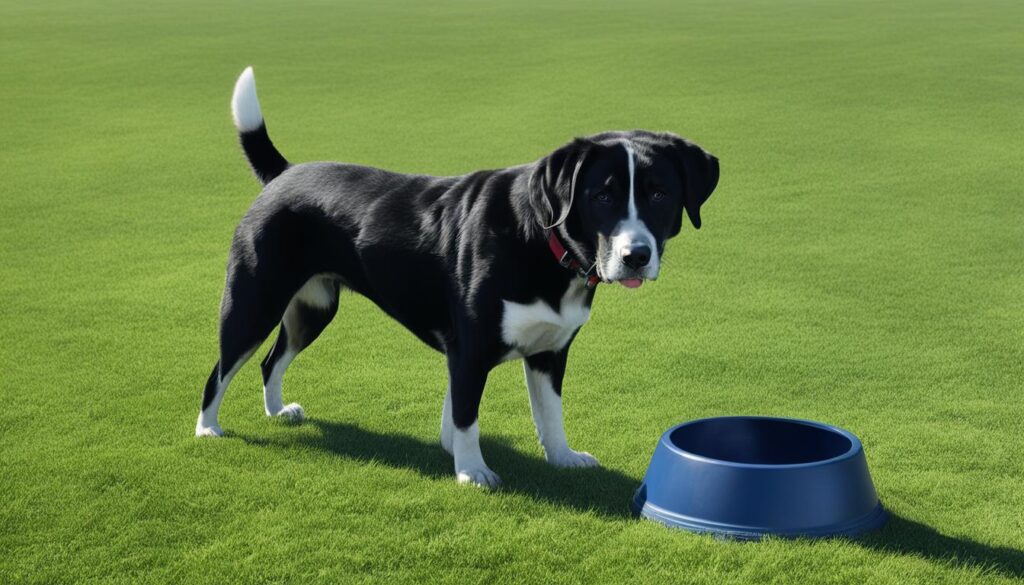As a dog owner, I understand the temptation to share our favorite foods with our furry friends. However, when it comes to sourdough bread, it’s important to be cautious. While a small bite of baked bread may not be harmful, uncooked sourdough bread can pose serious health risks for dogs.
Sourdough bread contains yeast, which can cause bloating and gastrointestinal issues in dogs. The fermentation process in sourdough bread can also produce alcohol in their stomach, leading to alcohol poisoning. It’s crucial to prioritize the well-being of our dogs and avoid feeding them sourdough bread.
Key Takeaways:
- Sourdough bread can cause bloating and gastrointestinal issues in dogs due to the yeast it contains.
- The fermentation process in sourdough bread can produce alcohol in a dog’s stomach, leading to alcohol poisoning.
- Signs of bloat in dogs include a distended belly, drooling, agitation or pacing, and inability to vomit.
- Alcohol poisoning in dogs can cause disorientation, vomiting, tremors, and difficulty breathing.
- Feeding dogs sourdough bread offers little nutritional value and can contribute to obesity.
Why is Sourdough Bread Bad for Dogs?

Sourdough bread can be detrimental to a dog’s health for several reasons. Firstly, when dogs consume sourdough bread, it can cause bloating and have adverse effects on their gastrointestinal system. The bread expands in their stomach, leading to discomfort, pain, and potentially serious conditions like gastric dilatation-volvulus (GDV).
The fermentation process in sourdough bread poses another threat to dogs. This process produces alcohol, which is toxic to them. Consuming alcohol from sourdough bread can result in a drop in their blood sugar, body temperature, and blood pressure, endangering their well-being.
Overall, it is crucial to understand that sourdough bread is not safe for dogs and should be avoided to prevent any potential harm to their health.
| Risks of Sourdough Bread for Dogs |
|---|
| Bloating and gastrointestinal issues |
| Risk of gastric dilatation-volvulus (GDV) |
| Potential alcohol poisoning |
| Drop in blood sugar, body temperature, and blood pressure |
Signs of Bloat in Dogs

Bloat, also known as gastric dilatation-volvulus (GDV), is a serious condition that can occur in dogs who have consumed sourdough bread. It is important for dog owners to be aware of the signs and symptoms of bloat in order to seek immediate veterinary care for their furry companions.
Some common signs of bloat in dogs include:
- A distended belly: The dog’s abdomen may appear swollen or bloated.
- Drooling: Excessive drooling may be observed in dogs with bloat.
- Agitation or pacing: Dogs with bloat may exhibit signs of restlessness or anxiety.
- Inability to vomit: Dogs with bloat may attempt to vomit but be unable to do so.
- Foamy saliva: The dog may produce foamy or frothy saliva.
- Rapid or shallow breathing: Dogs with bloat may have difficulty breathing or exhibit abnormal breathing patterns.
- Extra attention to the stomach: Dogs may paw at their stomach or display increased sensitivity when their abdomen is touched.
If you notice any of these signs in your dog, it is crucial to contact a veterinarian immediately. Bloat can be a life-threatening condition that requires prompt medical intervention.
| Signs of Bloat in Dogs | Possible Causes |
|---|---|
| A distended belly | Gas buildup in the stomach |
| Drooling | Excessive saliva production |
| Agitation or pacing | Discomfort or pain in the abdomen |
| Inability to vomit | Blockage in the digestive system |
| Foamy saliva | Fluid accumulation in the stomach |
| Rapid or shallow breathing | Pressure on the diaphragm |
| Extra attention to the stomach | Discomfort or distention of the abdomen |
It is important to remember that bloat can be a life-threatening emergency, and prompt veterinary care is essential for the well-being of your dog.
What is Alcohol Poisoning in Dogs?

Alcohol poisoning in dogs is a serious condition that occurs when dogs consume alcohol, either directly or indirectly. The fermentation process in sourdough bread, for example, can produce alcohol in a dog’s stomach, leading to alcohol poisoning. When yeast ferments in the dog’s stomach, it produces alcohol, which is toxic to them. It is important for dog owners to be aware of the signs and symptoms of alcohol poisoning in dogs to ensure prompt veterinary care.
Common signs of alcohol poisoning in dogs include:
- Disorientation
- Staggering
- Vomiting
- Diarrhea
- Tremors
- Loss of bodily movements (ataxia)
- Difficulty breathing
If you notice any of these signs in your dog, it is crucial to seek immediate veterinary care. Alcohol poisoning can have serious consequences for a dog’s health and well-being. Prompt intervention by a veterinarian can help minimize the risks and provide appropriate treatment.
In the case of sourdough bread, it is important to remember that even small quantities can be harmful to dogs due to the production of alcohol during the fermentation process. Therefore, it is recommended to avoid feeding sourdough bread to dogs altogether to prevent the risk of alcohol poisoning.
Note: The image above is for illustrative purposes only and does not depict a dog suffering from alcohol poisoning.
Risks of Feeding Dogs Sourdough Bread

Feeding dogs sourdough bread poses several risks to their health and well-being. The unique characteristics of sourdough bread can have detrimental effects on a dog’s digestive system.
One of the main risks is the potential for bloating and gastrointestinal issues. When dogs consume sourdough bread, the bread expands in their stomach, causing discomfort and potential complications. This expansion can lead to bloating, gas, and digestive discomfort.
Another significant risk is the fermentation process involved in making sourdough bread. This process can produce alcohol in the dog’s stomach, leading to alcohol poisoning. Alcohol is toxic to dogs and can cause a range of symptoms, including a drop in blood sugar, body temperature, and blood pressure.
Furthermore, sourdough bread offers little nutritional value for dogs. It is high in carbohydrates and lacks essential nutrients that dogs need for optimal health. Feeding dogs sourdough bread regularly can contribute to obesity and an imbalanced diet.
It is crucial to prioritize the well-being of our dogs and provide them with a balanced and nutritionally appropriate diet. Instead of feeding dogs sourdough bread, opt for dog-friendly treats and foods that meet their nutritional needs. Consulting with a veterinarian can provide further guidance on suitable dietary options for dogs.
Remember, the digestive system of dogs is different from humans, and what may be safe for us to consume can pose risks to their health.
Preventing Problems with Dogs and Bread

To prevent potential problems with dogs and bread, it is important to follow certain guidelines. It’s tempting to share a piece of bread with your furry friend, but it’s crucial to resist the urge, especially when it comes to sourdough bread. While a small nibble may not cause immediate harm, it’s best to avoid giving dogs bread altogether.
One significant risk associated with bread consumption is the ingestion of raw dough. When dogs consume raw dough, it continues to ferment in their stomach, leading to the production of alcohol. This can have serious consequences for their health, including alcohol poisoning. To prevent this, it is vital to keep raw dough out of their reach and ensure it is securely stored.
Dogs should never be left unattended near food, especially bread. It’s advisable to ask guests not to give your dog any human foods, including bread, to avoid potential digestive issues and food toxicity. While it may be tempting to share your plate with your furry friend, it’s essential to stick to a diet specifically formulated for their needs.
Special attention should be paid to dogs during holidays and parties, where they may encounter various foods, including bread. It is crucial to monitor them closely and keep them away from any food that may be harmful to their health. Additionally, it’s important to be aware of any food allergies your dog may have to prevent any adverse reactions.
Remember, prevention is key when it comes to dogs and bread. By following these guidelines, you can ensure the well-being and safety of your furry friend.
Dogs and Bread: A Word of Caution
“It is important to resist the temptation to give dogs bread, especially sourdough, as it can cause digestive issues and alcohol poisoning. Always prioritize their specific dietary needs and avoid feeding them human foods.”
| Guidelines | Benefits |
|---|---|
| Resist the temptation to give dogs bread | Prevents gastrointestinal issues and alcohol poisoning |
| Never give dogs raw dough | Avoids alcohol production and fermentation in their stomachs |
| Avoid leaving dogs unattended near food | Reduces the risk of ingestion of harmful substances |
| Ask guests to refrain from giving dogs human foods | Prevents digestive issues and potential allergic reactions |
| Monitor dogs during holidays and parties | Ensures their safety and prevents accidental ingestion of harmful foods |
| Be aware of your dog’s food allergies | Prevents adverse reactions and ensures their well-being |
Dogs and Allergies to Bread

Dogs, just like humans, can develop allergies to certain ingredients in bread, particularly wheat. When dogs are allergic to bread or its components, consuming it can lead to stomach upset and other adverse reactions.
It is crucial for dog owners to be aware of any food allergies their furry friends may have and avoid feeding them bread if they are allergic. Allergic reactions can manifest as gastrointestinal distress, such as vomiting and diarrhea, as well as skin problems like itching, redness, and rashes.
While bread, including sourdough bread, may be a staple in human diets, it does not provide significant nutritional value for dogs and can contribute to weight gain and obesity when consumed in excess.
Understanding your dog’s specific dietary needs and managing their food allergies are essential for their overall health and well-being. It is always best to consult with a veterinarian to get a proper diagnosis and guidance on managing your dog’s allergies.
| Allergy Symptoms | Management Tips |
|---|---|
| Stomach upset, vomiting, diarrhea | Avoid feeding bread and consult a veterinarian for proper diagnosis and treatment. Consider hypoallergenic dog food options. |
| Itching, redness, rashes | Refrain from feeding bread and monitor the dog’s skin closely. Use soothing sprays or consult a veterinarian for appropriate medication. |
| Weight gain, obesity | Limit bread intake and focus on balanced, nutritious dog food. Provide regular exercise to maintain a healthy weight. |
Training Dogs to Avoid Bread
Dogs have a natural tendency to beg and try to eat what their humans are consuming. It is important to train them to avoid bread and other human foods to prevent potential health risks. Here are some effective methods to help you train your dog to avoid bread:
- Sit in another room: Teach your dog to sit in another room while you are eating. This will create a physical barrier between your dog and the bread, helping them understand that it is not for them.
- Provide substitutes: Offer your dog healthy dog treats or their regular kibble as a substitute for bread. This will redirect their focus and satisfy their cravings without exposing them to potential harm.
It is crucial to keep bread and other potential harmful foods out of your dog’s reach to ensure their optimal health and well-being. By consistently implementing these training techniques, you can help your dog develop good eating habits and prevent them from consuming bread.
“Dogs have a natural inclination to beg for food, but it is our responsibility as pet owners to train them to avoid foods that can be harmful to their health.”
Can Dogs Have Cooked Sourdough Bread as an Occasional Treat?
While sourdough bread is generally not recommended for dogs, cooked sourdough bread can be given as an occasional treat. It is important to note that sourdough bread is still carb-heavy and provides little nutritional value for dogs. Therefore, it should not be a regular part of their diet and should be given in moderation.
When considering giving your dog cooked sourdough bread as a treat, it is essential to take into account their overall health and any potential allergies they may have. Some dogs may have sensitivities to certain ingredients in bread, such as wheat, which can cause stomach upset and other adverse reactions.
Although cooked sourdough bread can be enjoyed by dogs in small amounts, it is crucial to prioritize their balanced diet and ensure they receive proper nutrition from their regular dog food. Opting for treats specifically formulated for dogs or homemade dog treats with nutritious ingredients is a healthier option. These treats can still provide the satisfaction of a sourdough flavor while ensuring your dog’s well-being.
Remember, moderation is key when it comes to feeding your dog cooked sourdough bread. It is always recommended to consult with your veterinarian before introducing any new treats into your dog’s diet. By making informed choices and prioritizing your dog’s health, you can ensure they enjoy their occasional treat without compromising their overall well-being.
Homemade Sourdough Dog Treats
If you want to treat your dog to a sourdough flavor, it is better to opt for homemade sourdough dog treats. These treats can be made using sourdough starter, but they should be cooked thoroughly to avoid any potential risks. There are various recipes available for homemade sourdough dog treats that incorporate other nutritious ingredients for dogs. It is important to ensure that the treats do not contain any harmful substances and are suitable for your dog’s dietary needs.
When making homemade sourdough dog treats, you have control over the ingredients used, ensuring that they are safe and healthy for your pet. Adding nutritious ingredients like vegetables or lean proteins can provide additional health benefits. However, it is crucial to avoid common ingredients that are toxic to dogs, such as chocolate, onions, garlic, and certain artificial sweeteners like xylitol.
To help you get started, here is a simple recipe for homemade sourdough dog treats:
- In a mixing bowl, combine 1 cup of sourdough starter with 1 cup of whole wheat flour.
- Add 1/2 cup of grated carrots or sweet potatoes for added nutrients.
- Knead the mixture until it forms a dough-like consistency.
- Roll out the dough on a floured surface and use cookie cutters to create fun shapes.
- Place the treats on a baking sheet and bake at 350°F (175°C) for 20-25 minutes, or until golden brown.
- Allow the treats to cool completely before serving them to your dog.
Remember to always consult with your veterinarian before introducing any new treats or ingredients into your dog’s diet, especially if they have specific dietary restrictions or health conditions. Homemade sourdough dog treats can be a safe and delicious way to treat your canine companion, but moderation is key. Treats should only make up a small portion of your dog’s overall diet and should never replace a balanced and nutritious dog food.
Tips to Prevent Dogs from Eating Sourdough Bread
To prevent dogs from eating sourdough bread, it is crucial to take specific precautions and implement proper training methods. By doing so, you can ensure the safety of your furry friend and protect them from any potential harm associated with consuming sourdough bread.
1. Keep dogs away from the fermentation area:
During the sourdough bread fermentation process, it is essential to keep your dogs away from the area where the bread is being made. This will prevent them from accessing the raw dough, which can expand in their stomachs and lead to gastrointestinal issues.
2. Safely store raw dough:
When storing raw dough, make sure it is securely stored out of your dog’s reach. Dogs have a keen sense of smell and can be attracted to the enticing aroma of the dough. To avoid any accidental ingestion or unwanted consumption, store it in sealed containers or refrigerate it safely.
3. Cool baked bread out of sight:
After baking sourdough bread, it’s essential to cool it away from your dog’s sight. The smell and appearance of freshly baked bread can tempt dogs, making it crucial to keep it out of their reach and prevent any attempts to consume it.
4. Train your dog to stay out of the kitchen:
Training your dog to stay out of the kitchen is an effective way to prevent them from accessing bread or any other potentially harmful foods. Consistent and positive reinforcement training can help establish boundaries and reinforce the behavior of staying away from food preparation areas.
By following these tips, you can effectively prevent dogs from eating sourdough bread and ensure they remain safe and healthy. Remember, it’s always best to prioritize a balanced and nutritious diet formulated specifically for dogs to meet their unique dietary needs.
Wrapping Up
In conclusion, it is not safe for dogs to eat sourdough bread. This type of bread can lead to various health issues in dogs, including bloating, gastrointestinal problems, and alcohol poisoning. While feeding dogs cooked sourdough bread as an occasional treat is acceptable, it should not be a regular part of their diet. It is crucial to be aware of any food allergies your dog may have and take precautions to prevent them from consuming sourdough bread.
To ensure the well-being of our furry friends, it is recommended to stick to a balanced diet specifically formulated for dogs. This means avoiding the temptation to share bread, including sourdough, with our canine companions. By providing them with a nutritious and appropriate diet, we can help prevent potential health issues and keep our dogs happy and healthy.
Remember, each dog is unique, so it’s important to consult with a veterinarian about your dog’s specific dietary needs. By prioritizing their health and making informed choices about their diet, we can ensure that our dogs live their best and healthiest lives.
FAQ
Can dogs eat sourdough bread?
Sourdough bread is not recommended for dogs due to the risks it poses to their health.
Why is sourdough bread bad for dogs?
Sourdough bread can cause bloating, gastrointestinal issues, and alcohol poisoning in dogs.
What are the signs of bloat in dogs?
Signs of bloat in dogs include a distended belly, drooling, agitation, and difficulty vomiting.
What is alcohol poisoning in dogs?
Alcohol poisoning in dogs occurs when the fermentation process in sourdough bread produces alcohol, leading to symptoms such as disorientation and trembling.
What are the risks of feeding dogs sourdough bread?
Feeding dogs sourdough bread can lead to bloating, gastrointestinal issues, and alcohol poisoning.
How can I prevent problems with dogs and bread?
To prevent problems, it is important to avoid feeding dogs bread, keep them away from unattended food, and be aware of any food allergies.
Can dogs have allergies to bread?
Yes, dogs can have allergies to bread, including wheat, which can cause stomach upset and other adverse reactions.
How can I train my dog to avoid bread?
Training your dog to avoid bread can be done by providing alternative treats or kibble and keeping them away from the kitchen and food areas.
Can dogs have cooked sourdough bread as an occasional treat?
Cooked sourdough bread can be given as an occasional treat, but it should not be a regular part of their diet.
Can I make homemade sourdough dog treats?
Yes, you can make homemade sourdough dog treats using sourdough starter and other nutritious ingredients suitable for dogs.
How can I prevent dogs from eating sourdough bread?
To prevent dogs from eating sourdough bread, keep the bread safely stored away, cool it out of their sight, and train them to stay out of the kitchen and away from food areas.






